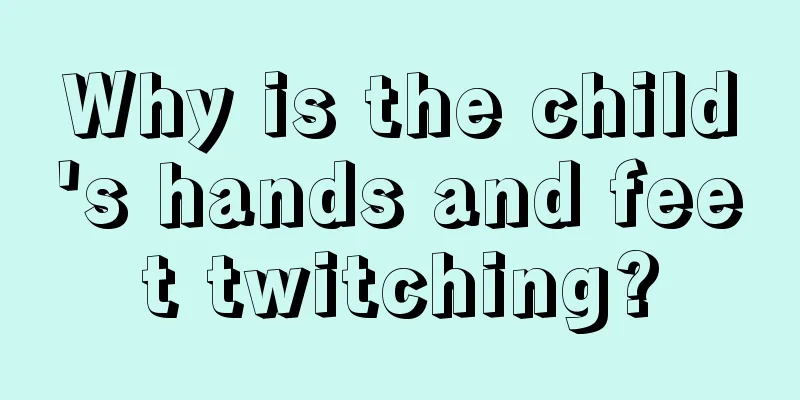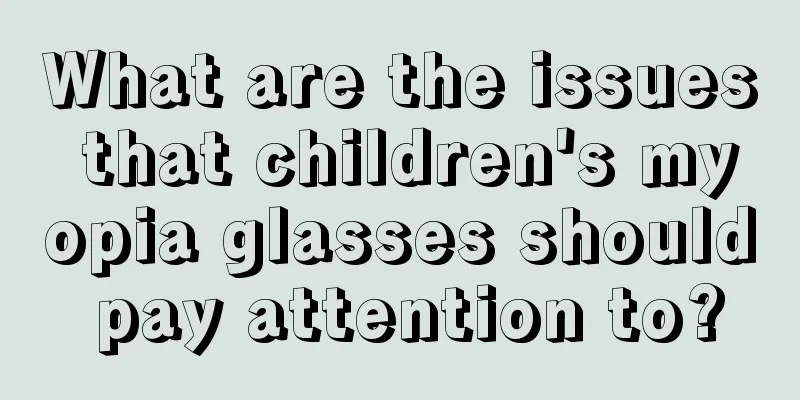Why is the child's hands and feet twitching?

|
For children, the cerebral cortex is relatively thin, and the central nervous system is still in the development process, so they are prone to convulsions while sleeping. Of course, these convulsions are divided into physiological convulsions and disease convulsions. If you have convulsions occasionally, don't worry too much, but if the convulsions are frequent, this may be caused by some serious disease and you need to go to the hospital for examination in time. Diagnosis of convulsions in children 1. Infectious diseases such as sepsis, purulent meningitis, neonatal tetanus, pneumonia, etc. often cause convulsions, which usually occur 3-7 days after birth. These diseases often cause serious consequences in the neonatal period due to their atypical manifestations and the inability to diagnose and treat them in a timely manner. 2. Metabolic abnormalities, such as hypoglycemia, hypocalcemia, hyponatremia, hypernatremia, and vitamin B deficiency, are also common causes of neonatal convulsions. Other conditions, such as cerebral hypoplasia and kernicterus caused by hemolytic disease of the newborn, can also cause convulsions. On the other hand, convulsions themselves can also have serious consequences. During convulsions, the body's oxygen and heat consumption greatly increase; the body is in a state of hypoxia, which causes sugar metabolism disorders. The longer the convulsion lasts, the more severe the level of hypoxia and low sugar levels. Brain cells have the worst tolerance to hypoxia. If they are completely deprived of oxygen for 6 minutes, irreversible changes will occur in brain cells. The impact of hypoxia on the cerebral cortex can not only cause many sequelae, such as epilepsy, low IQ, etc., but may also cause abnormalities in personality and behavior in children, becoming a factor of social instability. What causes convulsions? Neonatal convulsions are one of the common symptoms with a high incidence rate. It is a symptom of many diseases. Its clinical manifestations are atypical and sometimes difficult to identify. They are often manifested as paroxysmal eye activities (blinking, eye movements or tremors) and oral and cheek twitching. Intracranial hemorrhage and brain tissue hypoxia caused by neonatal asphyxia are the most common causes of neonatal convulsions. It usually occurs within 12 days after birth, and survivors may develop epilepsy, hemiplegia, low IQ, hydrocephalus, etc. in the future. Other reasons : 1. Central nervous system diseases are often seen in intracranial hemorrhage, meningitis, kernicterus and brain malformations; 2. Neonatal tetanus often causes convulsions 4 to 6 days after birth, accompanied by trismus; 3. Children with metabolic disorders, hypocalcemia, hypomagnesemia and hypoglycemia may suffer from convulsions. Ways to prevent convulsions If a newborn baby has convulsions, parents must remain calm and not rock the convulsing baby in their arms, as vibrations will aggravate the convulsions. The child should be laid flat on the bed as soon as possible, lying down, keeping the child's airway open, with the head tilted to one side to prevent vomitus from being inhaled into the trachea. Pressing the Ren Zhong and Hegu points of the child with your thumb has a certain effect. After the convulsions stopped, the patient was sent to the hospital for further examination and treatment. If the convulsion continues, go to the hospital for treatment immediately. |
<<: Why do babies' hands and feet twitch when they fall asleep?
>>: What are the sequelae of lumbar puncture in children?
Recommend
What is the reason why children always wet the bed?
In life, many children have the habit of bedwetti...
What are some quick ways to stop cough in children?
If children cough, it is actually very bad for th...
What should I do if my baby’s scrotum is small?
Many mothers have reported that when they found t...
What medicine is good for children's genital itching
Since children usually play around and do not pay...
How to deal with the placenta of a newborn
The placenta is an important transitional organ f...
Symptoms of albinism in children
When it comes to diseases, many people are famili...
What should I do if my child has chronic cough?
Parents often encounter some problems. For exampl...
Seven month old baby has diarrhea
It would be heartbreaking to hear that a seven-mo...
What to do if your child has bad breath
If parents find that their children have bad brea...
Can babies bask in the sun through glass?
After a child is born, he or she needs extra care...
What are the best ways to reduce fever in children?
If a child has a fever, parents will definitely b...
If your child is nauseous and vomiting, observe the symptoms and then treat them
Sometimes children will experience symptoms of na...
What's wrong with the bulge of the front fontanelle?
The anterior fontanelle is unfamiliar to mothers ...
What should I do if my baby has bronchitis and fever?
The baby is still young and is often attacked by ...
What is the treatment method for foreign matter in baby's eyes?
Foreign objects in the eyes can cause great harm ...









